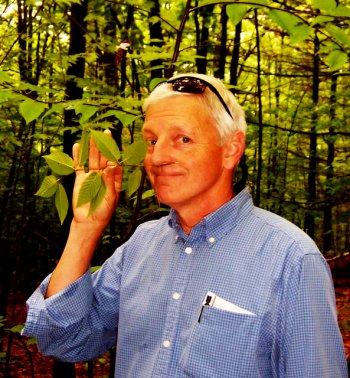Botany teacher Chris Kane demonstrated how to “botanize with the nose” when I was among 10 people on an Osher Lifelong Learning Institute field trip May 30 in Winant Park. As Kane pointed out various plants along the forest trail, he frequently brought a leaf or small branch up to his nose to examine its smell.
First, it was the hay-scented fern. Picking up a frond of the fern, Kane crushed it in his hand and passed it around for us to whiff. As its name implies, it has the fragrance of freshly mowed hay. Unlike most ferns, the hay-scented fern is sun-loving and can create a fancy green carpet in an open space of the forest that is flooded with sunlight.
When we came to some sweet fern, Kane said it is really not a fern but a spicy-scented shrub. The pleasant smell of the sweet fern was used as a natural insect repellent by the Native Americans when they rubbed the crumbled leaves on their skin. I saw some in our group doing the same thing and enjoying the aromatic experience. When camping, throw some sweet fern on your campfire to help drive away the insects. Also, prior to picking berries, line your pail with sweet fern which will serve to keep your berries fresh.
Coming to a black birch sapling, Kane broke off a small branch, pealed off the outer bark and brought the exposed inner bark up to his nose. Then he passed it around the group asking, “What do you think this smells like?” The common consensus was that it smelled just like root beer or birch beer.
Donald Peattie, in A Natural History of Trees in Eastern and Central North America, explained how to make birch beer. He wrote, “Tap the black birch tree as the sugar maple is tapped in the spring when the sap is rising and the buds are just swelling; jug the sap and throw in a handful of shelled corn and natural fermentation – so the mountaineers tell us – will finish the job for you.”
Kane teaches botany at Antioch Graduate School and is a member of the Concord Conservation Commission and the former chair of the Five Rivers Conservation Trust. He does rare plant surveys and land conservation consulting for the Nature Conservancy, the Society for the Protection of New Hampshire Forests, the U.S. Fish and Game Service and the New Hampshire Fish and Game Department.
OLLI, of Granite State College, which sponsored the field trip, is an educational program for lifelong learners age 50 and older. We all had a good time following Kane's example to “botanize with our noses.”









